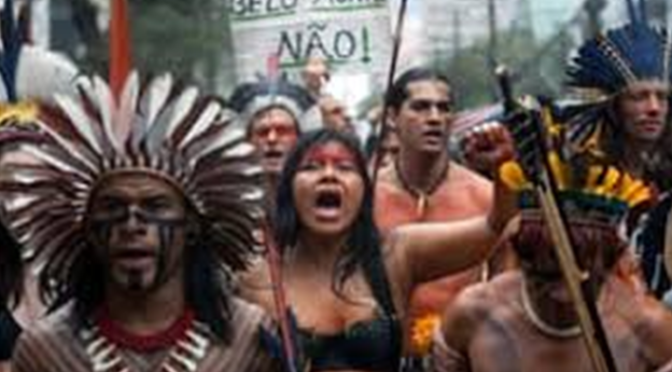Stolen Land, Stolen Rights
Posted on : February 3, 2019Author : AGA Admin

Brazil recently elected Jair Bolsonaro, a far right former army captain as their President. His views on women, LGBT rights, abortion, environment inter alia point to a covert fascist regime that might drag Brazil’s democracy into the dated era of 1960s military rule. The most imminent threat however, is towards the indigenous population of Brazil.
Indigenous population shrunk from 11 million to 900,000 in last 500 years mainly due to foreign invasions and industrialization. However, empowered by the Brazilian Constitution (1988)and Brazilian Supreme Federal Court judgments, they managed to conserve much of their language and custom in light of rapid industrialization. The Constitution specifically enumerates rights of indigenous peoples in Chapter VIII. The Transitory Constitutional Regulations holds their right over land as original rights, prior to the creation of State itself, making a de facto recognition that they were the first occupants of Brazil. Article 231 (2), clearly delineates that no force or action can take away land occupied by the indigenous population. Recently, the apex court, Supreme Federal Court(STF), has sided with the indigenous peoples in their long standing land dispute against the Mato Grosso state. This decision upholds the recommendations of UN Special Rapporteur, Victoria Tauli-Corpuz, that the STF must “ensure that future judgements on the rights of indigenous peoples are fully consistent with national and international human rights standards”.
As a growing economy, Brazil is committing to a rigorous development regime in the Amazon. The Amazon is home to some of the rarest tribes in the world. The smallest consists of just one man while the largest tribe Guarani, numbers around 51,000. These tribes are hunter-gatherers operating through detailed mental maps of topography, flora, fauna and hunting spaces. The increased industrial activities are rapidly altering these horizons. According to a recent study by World Bank, indigenous lands are the most important barrier to Amazon deforestation. Thus, healthy existence of the indigenous population is intricately linked to the Amazon and an attack on one adversely affects the other. Several hydro-electric complexes are being built near land occupied by uncontacted indigenous groups, threatening to deprive them of their land, water and livelihoods. Recently, Bolsonaro’s demands for indigenous peoples to “bow to the majority or simply disappear”, calls for concern especially when their rights are protected by the Constitution and are recognised by various UN instruments. This approach is antithetical to the Constitution and needs to be read together with the increasing crimes committed against them. An expert committee by the UN in 2017 noted that Brazil has seen the highest number of killings of environmental and land defenders of any country over the last 15 years.
In the past the Inter-American Court of Human Rights has held the Brazilian state liable for violating voting rights of the indigenous peoples. The European Parliament had also expressed its deep concern over potential amendments in the Brazilian constitution that threatened to undermine their rights and called on national authorities to comply with their human rights obligations. Last year, a Congressional Investigative Commission’s report called for stripping the FUNAI and accused the United Nations of “influencing Brazilian policy” through its agencies, ILO Convention 169, and UN Declaration on the Rights of Indigenous Peoples.
Bolsonaro’s election has propelled the fate of the federal agencies (Fundação Nacional do Índio (FUNAI) and Ministry of Environment) responsible for protection of the indigenous peoples into a lasting uncertainty. FUNAI is experiencing laying off of veterans and shutting down of field posts, furthering the precarious condition of indigenous peoples. Already suffering a scarce budgetary allocation, both agencies are expected to lose further under Bolsonaro.
Compelling the minority to bend for the interests of majority will be ultra vires the constitution and against the Paris Agreement. Paris Agreement and the 2030 Agenda for Sustainable Development recognizes the global role of indigenous peoples in curbing climate change; they are also aligned with the two main international agreements for the rights of indigenous peoples— U.N. Declaration on the Rights of Indigenous Peoples and ILO’s Indigenous and Tribal Peoples Convention. However, in practice, their rights — especially those related to land and resource tenure — are not always recognized or respected as is evident from the present scenario in Brazil.
The future of Amazon and indigenous peoples is looming in uncertainty.
Will Bolsonaro’s Brazilian miracle be at the cost of the indigenous?
Abhilash Pattnaik (Intern, AGA) and Yashasvani Vashisht(Guest Author)





Leave a Reply